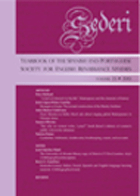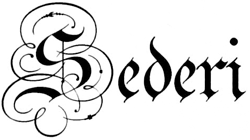
Sederi 23
Sederi 23 — 2013
EDITORS
Berta Cano Echevarría & Ana Sáez-Hidalgo
REVIEW EDITOR
Francisco J. Borge López
ISSN 1135-7789
Patricia Parker, “Cymbeline: Arithmetic, Double-Entry Bookkeeping, Counts, and Accounts.” SEDERI 23 (2013): 95-119.
DOI: https://doi.org/10.34136/sederi.2013.5 Download PDF
Abstract
The importance of commercial arithmetic and double-entry bookkeeping (or “debitor and creditor” accounting) has been traced in The Merchant of Venice, Othello, the Sonnets, and other works of Shakespeare and his contemporaries. But even though both are explicitly cited in Cymbeline (the only Shakespeare play other than Othello to invoke double-entry by its contemporary English name), their importance for this late Shakespearean tragicomic romance has yet to be explored. This article traces multiple ways in which Cymbeline is impacted by arithmetic and the arts of calculation, risk-taking, surveying, and measuring; its pervasive language of credit, usury, gambling, and debt, as well as slander infidelity and accounting counterfeiting; the contemporary conflation of the female “O” with arithmetic’s zero or “cipher” in relation to alleged infidelity; and the larger problem of trust (from credere and credo) that is crucial to this play as well as to early modern England’s culture of credit.
Keywords: Cymbeline; Shakespeare; double-entry bookkeeping; Hindu-Arabic numbers; arithmetic; military science; feminist criticism; gender; transvestite theatre; knowledge production; rhetoric; mathematics; history of accounting; economic criticism.
References
Aho, James 1985. “Rhetoric and the Invention of Double-Entry Bookkeeping.” Rhetorica 3/1:21-43.
Aho, James 2005. Confession and Bookkeeping. Albany: State University of New York Press.
Bady, David 1985. “The Sum of Something: Arithmetic in The Merchant of Venice.” Shakespeare Quarterly 36/1:10-30.
Baker, Humphrey 1574. The Wellspring of Sciences. London.
Baker, Humphrey ca. 1590. “Such as are desirous, either themselves to learn, or to have their children or servants instructed in any of these arts and faculties here under named, it may please them to repair unto the house of Humphry Baker.” London: Thomas Purfoot [?]. STC 1209.3. Broadsheet.
Belsey, Catherine 1999. Shakespeare and the Loss of Eden. New Brunswick: Rutgers University Press.
Bernstein, Peter L. 1996. Against the Gods: The Remarkable Story of Risk. New York: John Wiley & Sons.
Betteridge, Thomas 2013. “Writing faithfully in a post-confessional world.” Eds. Andrew J. Power and Rory Loughnane. Late Shakespeare, 1608-1613. Cambridge: Cambridge University Press: 225-242.
Blank, Paula 2006. Shakespeare and the Mismeasure of Renaissance Man. Ithaca: Cornell University Press.
Boyer, Carl B. 1968. A History of Mathematics, second ed. rev. Uta C. Merzback. New York: John Wiley & Sons.
Butler, Martin 2005. Ed. Cymbeline. Cambridge: Cambridge University Press.
Crosby, Alfred W. 1997. The Measure of Reality: Quantification and Western Society, 1250-1600. Cambridge: Cambridge University Press.
Digges, Leonard and Thomas 1579. An Arithmeticall Militarie Treatise, Named Stratioticos. London.
Digges, Thomas 1590. An Arithmetical Warlike Treatise Named Stratioticos. London.
De Roover, Raymond 1974. Business, Banking, and Economic Thought in Late Medieval and Early Modern Europe. Ed. Julius Kirshner. Chicago: University of Chicago Press.
Edelman, Charles. 2000. Shakespeare’s Military Language: a dictionary. The Athlone Press.
Evans, G. Blakemore and J.J.M. Tobin. eds. 1997. The Riverside Shakespeare. Second Edition. Boston: Houghton Mifflin.
Fischer, Sandra K. 1985. Econolingua: A Glossary of Coins and Economic Language in Renaissance Drama. London: Associated University Presses.
Floyd-Wilson, Mary 2003. English Ethnicity and Race in Early Modern Drama. Cambridge: Cambridge University Press.
Gillen, Katherine 2011. “Chaste Treasure: Protestant Chastity and the Creation of a National Economic Sphere in The Rape of Lucrece and Cymbeline.” Early English Studies 4: 1-38.
Glimp, David, and Michelle Warren, eds. 2004. Arts of Calculation: Numerical Thought in Early Modern Europe. New York: Palgrave Macmillan.
Hadden, Richard W. 1994. On the Shoulders of Merchants: Exchange and the Mathematical Conception of Nature in Early Modern England. Albany: State University of New York Press.
Hawkes, David 2010. The Culture of Usury in Renaissance England. New York: Palgrave Macmillan.
Jaffe, Michele Sharon 1999. The Story of O: Prostitutes and Other Good-for Nothings in the Renaissance. Cambridge: Harvard University Press.
Kaplan, Robert 2000. The Nothing that Is: A Natural History of Zero. Oxford: Oxford University Press.
Kerrigan, John 2008. Archipelagic English. Oxford: Oxford University Press.
King, Ros 2007. “In Lieu of Democracy, or How Not to Lose Your Head: Theatre and Authority in Renaissance England.” Eds. Subha Mukerji and Raphael Lyne. Early Modern Tragicomedy. Cambridge: D. S. Brewer: 84-100.
Korda, Natasha 2009. “Dame Usury: Gender, Credit and (Ac)counting in the Sonnets and The Merchant of Venice.” Shakespeare Quarterly 60/2: 129-153.
Lyne, Raphael 2011. Shakespeare, Rhetoric, and Cognition. Cambridge: Cambridge University Press.
Lyne, Raphael 2013. “Cymbeline: Recognition in Cymbeline.” Eds. Andrew J. Power and Rory Loughnane. Late Shakespeare, 1608-1613. Cambridge: Cambridge University Press: 56-70.
Maley, Willy 2003. Nation, State, and Empire in English Renaissance Literature. New York: Palgrave Macmillan.
Maley, Willy 2008. “Cymbeline, the Font of History, and the Matter of Britain: From Times New Roman to Italic Type.” Ed. Diana E. Henderson. Alternative Shakespeares 3. New York: Routledge: 119-137.
McEachern, Claire 2006. Ed. Much Ado About Nothing. London: Thomson Learning.
Meek, Richard 2009. Narrating the Visual in Shakespeare. Farnham: Ashgate.
Mellis, John 1588. A Briefe Instruction and maner how to keepe bookes of Accompts after the order of Debitor and Creditor. London.
Menninger, Karl 1969. Number Words and Number Symbols. Cambridge, Mass.: The M.I.T. Press.
Muldrew, Craig 1998. The Economy of Obligation: The Culture of Credit and Social Relations in Early Modern England. London: Macmillan.
Murray, David 1978. Chapters in the History of Bookkeeping, Accountancy, & Commercial Arithmetic. New York: Narno Press.
Nosworthy, J. M. 1955. Ed. Cymbeline. London: Methuen.
Pacioli, Luca 1494. Summa de arithmetica, geometria, proportioni et proportionalità. Venice.
Palfrey, Simon 1997. Late Shakespeare: A New World of Words. Oxford: Oxford University Press.
Parker, Patricia 1987. Literary Fat Ladies: Rhetoric, Gender, Property. London: Methuen.
Parker, Patricia 1989. “Romance and Empire: Anachronistic Cymbeline.” Eds. George M. Logan and Gordon Teskey. Unfolded Tales. Ithaca, Cornell University Press: 189-207.
Parker, Patricia 1996. Shakespeare from the Margins. Chicago: University of Chicago Press.
Parker, Patricia 2004. “Temporal Gestation, Legal Contracts, and the Promissory Economies of The Winter’s Tale.” Eds. Margaret W. Ferguson and Nancy E. Wright. Women, Property, and the Letters of the Law. Toronto: University of Toronto Press: 25-49.
Parker, Patricia 2009. “Cassio, Cash, and the ‘Infidel 0’: Arithmetic, Double-entry Bookkeeping, and Othello’s Unfaithful Accounts.” Ed. Jyotsna G. Singh. A Companion to the Global Renaissance. Oxford: Wiley-Blackwell: 223-241.
Parolin, Peter A. 2002. “Anachronistic Italy: cultural alliances and national identity in Cymbeline.” Shakespeare Studies 30: 188-215.
Peele, James 1553. The maner and fourme how to kepe a perfecte reconyng, after the order of the moste worthie and notable accompte, of Debitour and Creditour. London.
Peele, James 1569. The Pathe waye to Perfectnes, in th’Accomptes of Debitour, and Creditour. London.
Pitcher, John 2005. Ed. Cymbeline. London: Penguin Books Ltd.
Poovey, Mary 1998. A History of the Modern Fact: Problems of Knowledge in the Sciences of Wealth and Society. Chicago: The University of Chicago Press.
Raman, Shankar 2008. “Death by Numbers: Counting and Accounting in The Winter’s Tale.” Ed. Diana E. Henderson. Alternative Shakespeares 3. New York: Routledge: 158-180.
Raman, Shankar 2010. “Specifying Unknown Things: The Algebra of The Merchant of Venice.” New York: Routledge: 212-231.
Recorde, Robert 1543. The Ground of Artes. Teachyng the worke and practise of Arithmetike. London.
Robson, Keith 1992. “Accounting Numbers as ‘Inscription’: Action at a Distance and the Development of Accounting.” Accounting, Organizations and Society 17/7: 685-708.
Rotman, Brian 1987. Signifying Nothing: The Semiotics of Zero. New York: St. Martin’s Press.
Ryner, Bradley D. 2008. “The Panoramic View in Mercantile Thought: Or, A Merchant’s Map of Cymbeline.” Eds. Barbara Sebek and Stephen Deng. Global Traffic: Discourses and Practices of Trade in English Literature and Culture from 1550 to 1700. New York: Palgrave Macmillan: 77-94.
Seife, Charles 2000. Zero: The Biography of a Dangerous Idea. New York: Penguin.
Siemon, James R. 1994. “Perplexed beyond self-explication’: Cymbeline and early modern/postmodern Europe.” Eds. Michael Hattaway, Boika Sokolova and Derek Roper. Shakespeare and the New Europe. London: T&T Clark: 294-309.
Spolsky, Ellen 2004. “Women’s Work is Chastity: Lucretia, Cymbeline, and Cognitive Impenetrability. Eds. Alan Richardson and Ellen Spolsky. The Work of Fiction: Cognition, Culture, and Complexity. Aldershot: Ashgate: 51-84.
Spurgeon, Caroline F. E. 1935. Shakespeare’s Imagery and What It Tells Us. Cambridge: Cambridge University Press.
Stanivukovic, Goran V. 1998. “‘The city’s usuries’: Commerce and Cymbeline.” Quidditas 19: 229-243.
Sullivan, Ceri 2002. The Rhetoric of Credit: Merchants in Early Modern Writing. London: Associated University Presses.
Swetz, Frank J. 1987. Capitalism and Arithmetic. La Salle, Illinois; Open Court Publishing Co.
Thomas, Keith 1987. “Numeracy in Early Modern England.” Transactions of the Royal Historical Society, Fifth Series, 37: 103-132.
Thorne, Alison. “‘To write and read / Be henceforth treacherous’: Cymbeline and the Problem of Interpretation.” Eds. Jennifer Richards and James Knolles. Shakespeare’s Late Plays: New Readings. Edinburgh: Edinburgh University Press: 176-190.
Turner, Henry S. 2006. The English Renaissance Stage: Geometry, Poetics, and the Practical Spatial Arts. Oxford: Oxford University Press.
Wayne, Valerie 2002. “The woman’s parts of Cymbeline.” Ed. Jonathan Gil Harris and Natasha Korda. Staged Properties in Early Modern English Drama. Cambridge: Cambridge University Press: 288-315.
Wayne, Valerie 2008. “Romancing the Wager: Cymbeline’s Intertexts.” Ed. Mary Ellen Lamb and Valerie Wayne. Staging Early Modern Romance. London: Routledge: 163-87.
Williams, Gordon 1994. A Dictionary of Sexual Language and Imagery in Shakespearean and Stuart Literature. 3 vols. London: Athlone Press.
Woodbridge, Linda 2003. Ed. Money and the Age of Shakespeare: Essays in New Economic Criticism. New York: Palgrave/St. Martin’s.
Woodbridge, Linda 2010. English Revenge Drama: Money, Resistance, Equality. Cambridge: Cambridge University Press.
